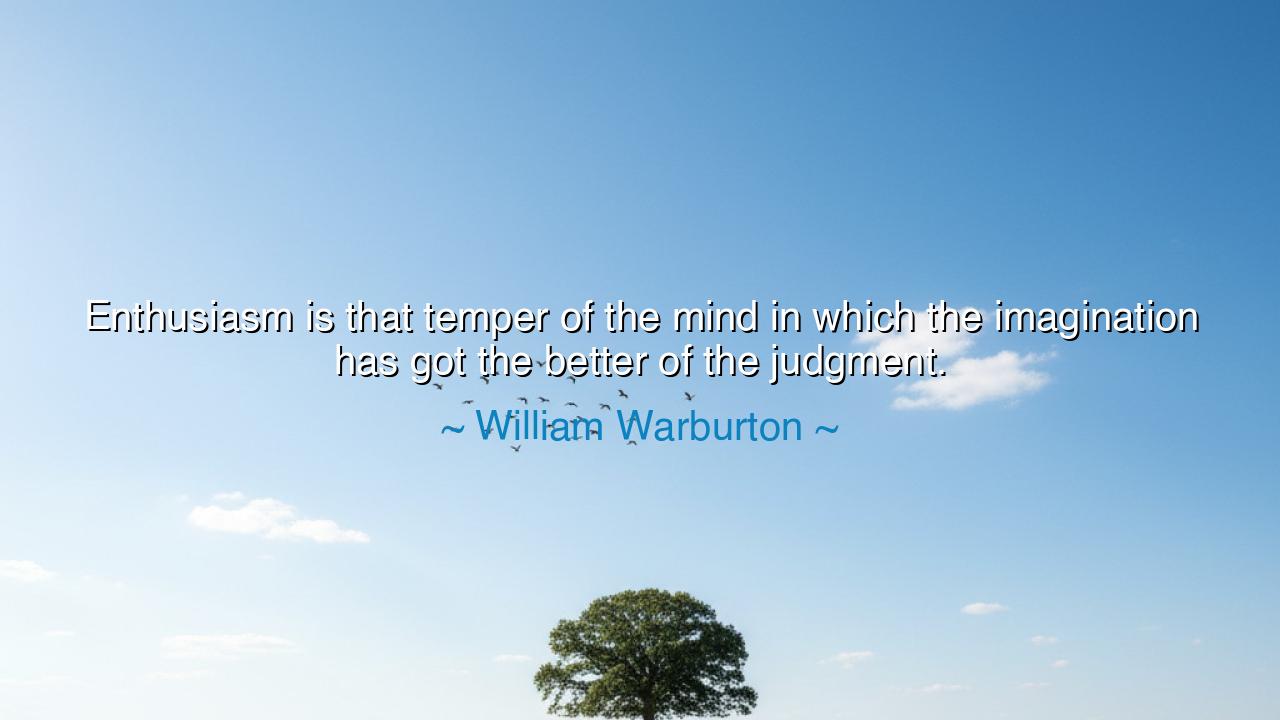
Enthusiasm is that temper of the mind in which the imagination
Enthusiasm is that temper of the mind in which the imagination has got the better of the judgment.






When William Warburton wrote, “Enthusiasm is that temper of the mind in which the imagination has got the better of the judgment,” he sought to describe a force that is both divine and dangerous—a fire that can illuminate the world or consume it. His words capture the eternal tension between imagination and judgment, between the spirit that dreams and the reason that restrains. To the wise, enthusiasm is not madness, but the quickening of the soul; yet to those who lose balance, it can become delusion. In this single sentence, Warburton—philosopher, theologian, and critic of the eighteenth century—unveiled the paradox of human greatness: that all great deeds spring from imagination unfettered, yet all wisdom demands the guidance of judgment.
The origin of this insight lies in the intellectual storms of Warburton’s time, when Europe wrestled with questions of faith, reason, and passion. The Enlightenment exalted the rational mind, yet beneath its cool light still burned the embers of enthusiasm—that ecstatic energy that moves poets, prophets, and revolutionaries. Warburton, ever a student of human nature, saw that enthusiasm arises when the imagination overpowers the cautious voice of reason. It is the mind inflamed by vision, the heart seized by possibility. In this state, a person is no longer ruled by calculation but by conviction. Such a condition can lift humanity to divine heights—or hurl it into folly. Thus, he did not condemn enthusiasm outright, but warned that when imagination conquers judgment entirely, wisdom gives way to chaos.
The ancients knew this truth well. Plato, in his Ion, spoke of the poet as one possessed by divine madness—enthousiasmos, the Greek word from which our own “enthusiasm” descends. To be “enthused” was to be filled with the god, to act under the power of a spirit greater than oneself. Such imagination can be transcendent, for through it the artist, the prophet, and the lover touch eternity. Yet Plato also warned that without the guiding hand of reason, such possession becomes perilous. The same fire that inspires can also destroy. Warburton, centuries later, clothed this ancient wisdom in modern terms, teaching that the mind must be both dreamer and judge—so that imagination may soar, but not burn its own wings.
History gives us examples of both the glory and ruin of unbridled enthusiasm. Consider the tale of Joan of Arc, the peasant girl who believed herself commanded by divine voices to lead France to victory. Her imagination—alive with vision and faith—lifted her from obscurity and inspired armies. She became a symbol of courage that transcended the power of kings. Yet that same fire, untempered by worldly caution, led her to the pyre. Her enthusiasm was her triumph and her undoing. She was consumed by the very passion that made her great. Through her, we see Warburton’s truth: when imagination eclipses judgment, the mind moves beyond human measure—capable of miracles, but also of tragedy.
Yet we must not mistake his warning for a rejection of enthusiasm itself. For without it, no great thing has ever been achieved. The discoverer who sails into uncharted seas, the artist who dares to paint the invisible, the reformer who challenges the tyrant—all are possessed by a sacred imagination that refuses the cautious voice of reason. Without that imbalance—without that beautiful madness—the world would never advance. Judgment alone preserves, but imagination creates. The wise, therefore, must not extinguish enthusiasm, but harness it, as the charioteer tames the wild horses of the soul, guiding their power toward glory rather than ruin.
In your own life, remember this harmony. When the flame of imagination burns within you, do not fear it—but neither let it consume you. Let enthusiasm be your wind, but let judgment be your compass. Dream, but measure; believe, but discern. When you feel the call to act, pause for a moment to let reason shape your vision. And when reason grows cold, let imagination rekindle its warmth. In the union of the two lies mastery.
For as William Warburton teaches, enthusiasm is not an enemy to reason, but its divine companion. It is the spark of creation that lifts humanity above the beasts and toward the stars. Yet even the stars burn within boundaries. To live wisely is to find balance between the fire that drives you and the wisdom that directs it. Guard your judgment, but never lose your imagination; for without it, the mind grows gray and the heart grows silent. But without judgment, imagination turns its light into flame—and the dreamer, consumed by his own fire, becomes the ash of his own creation.






AAdministratorAdministrator
Welcome, honored guests. Please leave a comment, we will respond soon